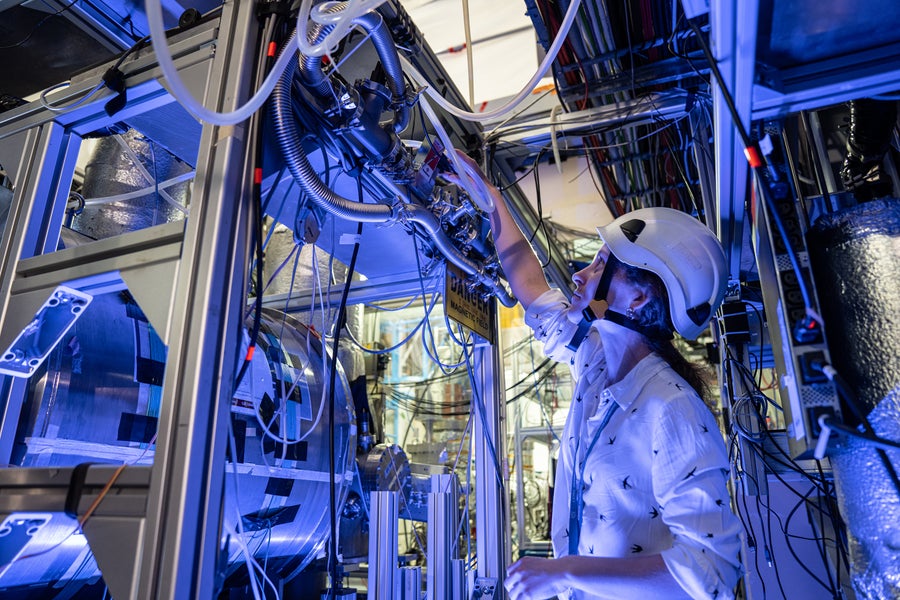First-Ever Antimatter Qubit Could Help Crack Cosmic Mysteries
The first antimatter qubit will help search for differences between matter and antimatter
Sakkmesterke/Science Photo Library/Getty Images
Physicists have created a quantum bit, or qubit, the fundamental storage unit of a quantum computer, out of antimatter for the first time. The researchers used magnetic fields to trap a single antiproton—the antimatter version of the protons inside of atoms—and measured how fast its spin changed direction for almost a full minute. The findings were published on July 23 in the journal Nature.
Quantum computers made of antimatter qubits are still a long way off and would be much harder to build than matter quantum computers—which are already extremely tricky. The feat is exciting, however, because of what such antimatter experiments could reveal about the universe itself.
A particle’s spin can be in a state of “up” or “down,” just like a computer bit can take on a state of “0” or “1.” But where a classical bit must be in either of the latter two states, the antiproton qubit’s spin could be up, down or any combination of both at the same time. This fantastical ability of qubits is what sets them apart from classical bits and promises that quantum computers will one day offer incredible improvements in calculation speed and ability compared with today’s computers.
On supporting science journalism
If you’re enjoying this article, consider supporting our award-winning journalism by subscribing. By purchasing a subscription you are helping to ensure the future of impactful stories about the discoveries and ideas shaping our world today.
The experiment demonstrated an unprecedented level of control over antimatter, says physicist Vincenzo Vagnoni of the Italian National Institute of Nuclear Physics (INFN), who was not involved in the experiment. “This is thanks to [the researchers’] development of highly efficient antiproton magnetic traps, which can keep antiprotons ‘alive’ without them annihilating with matter. While we are still far from the curvature engines of the Star Trek saga, this is the closest thing to them that has been developed on Earth so far,” Vagnoni says, referring to the science-fiction franchise’s warp drive engines fueled by antimatter.

Physicist Barbara Latacz works on the BASE experiment, which compares matter to antimatter.
Setting sci-fi aspirations aside, the achievement could help physicists solve the mystery of why the universe is dominated by matter and not antimatter—in other words, why the universe around us exists at all.
“If you are just looking into the physics, there’s absolutely no reason why there should be more matter than antimatter,” says Stefan Ulmer, a physicist at CERN, the European laboratory for particle physics near Geneva, and spokesperson for its Baryon Antibaryon Symmetry Experiment (BASE). Yet there is almost no antimatter in the cosmos, whereas matter is abundant. “The big motivation for these experiments is: we are looking for the reason why there might be a matter-antimatter asymmetry,” Ulmer says. One potential reason could be a difference between the proton and the antiproton in a property called the magnetic moment.
Protons and antiprotons have electric charge—the proton’s charge is positive, and the antiproton’s is negative. These charges make the particles act like little bar magnets that point in different directions depending on the orientation of their spin. The strength and orientation of the magnet is called the particle’s magnetic moment. If it turns out that the magnetic moments of protons and antiprotons are not the same, that could explain why matter won out over antimatter in the universe.
So far, measurements have found no difference between the two to an accuracy of 1.5 parts in a billion. But scientists had never before been able to measure the oscillation of the magnetic moment of single protons or antiprotons—or of any other fundamental particles. Similar previous experiments only measured the phenomenon in ions or charged atoms. “We can now have full control over the spin state of a particle,” says the new study’s lead author Barbara Latacz of CERN and the RIKEN Advanced Science Institute in Japan. “For fundamental physicists, it’s a super exciting opportunity.” The researchers hope to use the technique to improve the precision of the measurement of the magnetic moment in protons and antiprotons by a factor of 25.
If they ever discover a difference or find some other discrepancy between matter and antimatter, then antimatter quantum computers could become worth building, despite the difficulty. “If there is any surprise in matter-antimatter asymmetry, it could be interesting to do basically the same calculations with matter qubits and antimatter qubits and compare the results,” says Ulmer, who is also based at RIKEN.


